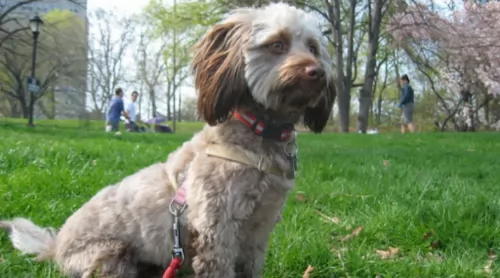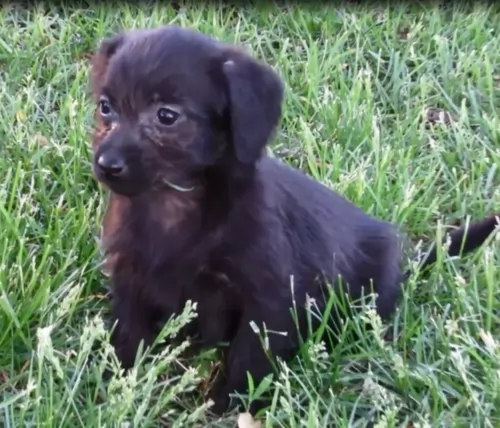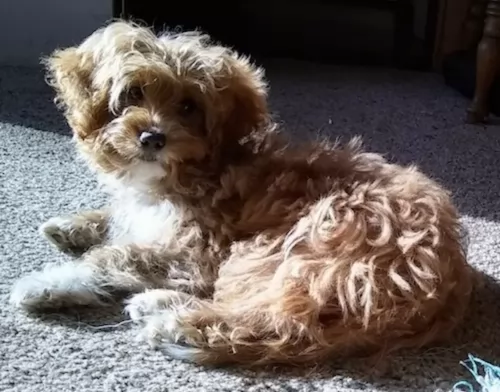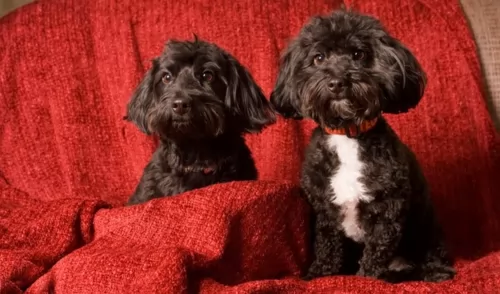 Petzlover
Petzlover Braque du Bourbonnais is originated from France but Doxiepoo is originated from United States. Braque du Bourbonnais may grow 32 cm / 13 inches higher than Doxiepoo. Braque du Bourbonnais may weigh 18 kg / 40 pounds more than Doxiepoo. Braque du Bourbonnais may live 3 years less than Doxiepoo. Both Braque du Bourbonnais and Doxiepoo has same litter size. Braque du Bourbonnais requires Low Maintenance. But Doxiepoo requires Moderate Maintenance
Braque du Bourbonnais is originated from France but Doxiepoo is originated from United States. Braque du Bourbonnais may grow 32 cm / 13 inches higher than Doxiepoo. Braque du Bourbonnais may weigh 18 kg / 40 pounds more than Doxiepoo. Braque du Bourbonnais may live 3 years less than Doxiepoo. Both Braque du Bourbonnais and Doxiepoo has same litter size. Braque du Bourbonnais requires Low Maintenance. But Doxiepoo requires Moderate Maintenance
 The Braque du Bourbonnais is an ancient breed, seen in the 15th century in France in the province of Bourbonnais. He became extremely popular with hunters by the 1800’s as a good pointer. He has become very popular in the United States and all of North America. There are often more puppies born in the U.S. than in France. The British call this breed the Bourbonnais Pointing Dog.
The Braque du Bourbonnais is an ancient breed, seen in the 15th century in France in the province of Bourbonnais. He became extremely popular with hunters by the 1800’s as a good pointer. He has become very popular in the United States and all of North America. There are often more puppies born in the U.S. than in France. The British call this breed the Bourbonnais Pointing Dog.
As with so many European hunting and working dogs, the Braque du Bourbonnais almost disappeared following World War I but was saved by the first breed club, established in 1925. Then following World War II, they were again in danger as the club dissolved and birth rates among the breed decreased drastically.
Actually, there were no dogs at all in the French registry between 1963 and 1973. This was attributed to the fact that the registry put more emphasis on the secondary characteristics such as color, length of tail) instead of the hunting characteristics. Because of this some hunter-breeders vowed to bring the real Braque du Bourbonnais back.
Michel Comte took on this task in 1970 but could not find any dogs with pure Bourbonnais blood. So, he took missed breed with characteristics like the Bourbonnais and inbred several litters until he had a dog he was satisfied with. He registered this dog with the LOF in 1973-75. Seeing this several other breeders got into the act and they successfully brought the breed back.
Michel became president of the new Club du Braque du Bourbonnais in 1981 and remained so until 2001. During this time the breed excelled at field trials and was first sent to the U.S. in 1988. The breed is now thriving in both Europe and North America.
 The Doxiepoo is a designer dog breed - a combination of the Dachshund who was used to hunt for Badgers and the Poodle, a dog bred in France to essentially be a lap dog. There is however some dispute as to whether the Poodle descends from Germany or from the French Barbet.
The Doxiepoo is a designer dog breed - a combination of the Dachshund who was used to hunt for Badgers and the Poodle, a dog bred in France to essentially be a lap dog. There is however some dispute as to whether the Poodle descends from Germany or from the French Barbet.
Wherever the parents hail from, the Doxiepoo hails from the United States of America.
With both the Poodle and the Dachshund being intelligent, fun and loving type of canines, the two of them together have brought out a wonderful hybrid pet in the Doxiepoo. Today, the Doxiepoo is bred with other Doxiepoos.
 This is an elegant breed with a medium sized, muscular bod and a round head. The nose will be the color of the coat and the muzzle is cone shaped with a wide base. He has large dark or hazel eyes, again depending on the color of the coat. The ears can drop below the throat and the neck is very muscular. He has a deep, wide chest and straight, muscular legs. The coat can come in two colors – liver and fawn – and ticked or spotted. They have a typical short pointer type tail.
This is an elegant breed with a medium sized, muscular bod and a round head. The nose will be the color of the coat and the muzzle is cone shaped with a wide base. He has large dark or hazel eyes, again depending on the color of the coat. The ears can drop below the throat and the neck is very muscular. He has a deep, wide chest and straight, muscular legs. The coat can come in two colors – liver and fawn – and ticked or spotted. They have a typical short pointer type tail.
 The Doxiepoo can range from being a small to medium sized dog, standing at anything between 20cm to 25cm in size and weighing between 3kg and 7kg, depending much on whether a standard, miniature or toy sized poodle was used in the breeding.
The Doxiepoo can range from being a small to medium sized dog, standing at anything between 20cm to 25cm in size and weighing between 3kg and 7kg, depending much on whether a standard, miniature or toy sized poodle was used in the breeding.
The Doxiepoo could look like either one of the two breeds, but he will have a strong, sturdy body with a curly or wavy coat of varying lengths and various colors - cream, black, tan, apricot, grey or white. The poodle side of him ensures he is a hypoallergenic dog.
Between the Dachshund and the Poodle, you’re going to get a wonderful array of characteristics as they both come with their strong points. Certainly you will be well entertained and amused by your pet, while he can also be useful as a watchdog.
Being a small dog, he will fit well into life in the city or in the countryside. He is as bright as a button and learns tricks and new skills quickly. With training and socialization he becomes obedient and well behaved wherever he is, getting on well with other pets in the home as well as with all children and adults.
The Doxiepoo is a lively, alert, energetic dog and will require being exercised – lots of ball games and a walk will keep him lean, muscular and content.
 Every dog, even the little ones like this, will require some kind of input from you if you want to get the best from him. Every puppy bought as a gift when they’re cute and cuddly turns into an adult, and often the very person who received him as a gift, loses interest and neglects him. Then they wonder why the dog becomes irritating and destructive.
Every dog, even the little ones like this, will require some kind of input from you if you want to get the best from him. Every puppy bought as a gift when they’re cute and cuddly turns into an adult, and often the very person who received him as a gift, loses interest and neglects him. Then they wonder why the dog becomes irritating and destructive.
A dog is a long term investment and if you commit to your sweet Doxiepoo, you’ll get years and years of devoted friendship.
 The life expectancy of the Doxiepoo is around 12-15 years of age if he is well looked after. He is a robust dog, but he can still face some health issues that both his parents contend with.
The life expectancy of the Doxiepoo is around 12-15 years of age if he is well looked after. He is a robust dog, but he can still face some health issues that both his parents contend with.
Just some of the diseases that the Doxiepoo might face while in your care are ear- and skin infections, dental disease, digestive tract problems, heart conditions and epilepsy. If you think your pet has any kind of illness, it is imperative to get him to the vet for a checkup.
Poodles, particularly are prone to skin disorders. They can be allergic to grass, parasites and food. If your Doxiepoo chews or licks his paws or some other area a lot, and the skin is red, he could have a skin allergy.
The vet will be able to diagnose your dog’s allergies with some skin- or blood testing. For instance, sebaceous adenitis is an inherited allergy that affects the lubrication of the skin and hair follicles. Symptoms of the disease include scaly skin, sore and even hair loss.
 This breed is prone to weight gain and obesity. Be careful not to overfeed them. Don’t free feed them but give them 2-3 smaller meals per day.
This breed is prone to weight gain and obesity. Be careful not to overfeed them. Don’t free feed them but give them 2-3 smaller meals per day.
Entropion - both of these are issues with eyelashes turning inward or outward and both can
Pulmonic Stenosis of the heart- minor will have no symptoms but eventually the heart will not be able to function efficiently and could lead to congestive heart failure.
The Braque du Bourbonnais needs at least a minimum amount of exercise daily , especially if he is not used for hunting. A fenced backyard for playtime would be perfect but long walks will work. He likes to learn tricks, play ball or hide and seek. Outside activities could include hiking, swimming, agility, retrieving, rally and obedience trials, along with the usual field trials.
 You can’t be sure what kind of coat your Doxiepoo will have but he will certainly require brushing at least twice a week. In some instances it may be wise to seek out the services of a professional groomer who does an excellent job of trimming the hair, cleaning the teeth, checking the ears and clipping the nails.
You can’t be sure what kind of coat your Doxiepoo will have but he will certainly require brushing at least twice a week. In some instances it may be wise to seek out the services of a professional groomer who does an excellent job of trimming the hair, cleaning the teeth, checking the ears and clipping the nails.
The Doxiepoo, just like any other dog, will need to be trained and socialized early as he is a stubborn dog and will need to be trained to be obedient. With this training and socialization, he becomes amicable around children and pets in the home. He learns easily too and this is what makes him a great pet for first time dog owners.
The Doxiepoo is a moderate energy dog, so he will do well on a walk every day. You can also make use of ropes, balls and frisbees to give him a bit of a workout in the garden.
He loves water too and will enjoy a run on the beach and cooling off in the ocean. He adapts easily to life in the city or in the country, so long as he is with his human companions.
The Doxiepoo will eat dry kibble, particularly if it is from the highest quality brands and chosen according to the dog’s size, age and activity levels.
Now and then you can add in a little bit of cooked rice, vegetables and chicken for variety. Some raw meat can play an important role in keeping the skin healthy and free from dryness and itchiness. Make sure that he always has fresh, cool water available to him.